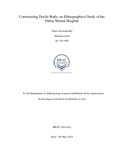Constructing docile body: an Ethnographical Study of the Pabna Mental Hospital
Abstract
The word ‘mad’ or ‘madness’ is very commonly used as a word that refers to several diversified person or situation. It has dissimilar meanings in different circumstances, varies from perspective to perspective that can have both ‘positive’ and ‘negative’ vibe. For example we can say that sometimes ‘madness’ indicates to a certain condition where a person becomes desperate for anything or any person. Besides, it is known as a severe mental illness. Mental illness is some kind of disorder that affects someone’s mental condition, stability, mood, thinking, behavior etc.1 In Bangla the meaning of ‘Mad’ is ‘পাগল’2 which does not carry a simple meaning either. It rather replicates a situation where a person becomes useless for the society or people and cannot do anything properly. Besides, It portrays a man violently to some extant with disrespect. Most of the time, the causes behind mental illness are unclear. It can come as a result of any kind of mental pressure, problems, anxiety, depression or even genetically. However, absolute cure of mental illness is difficult according to medical science. It needs altered treatment, specialized and controlled environment. Hence, mental patients need different treatment that includes comfortable environment as well, which often becomes impossible to be provided at home. Therefore, mental hospitals or mental asylums are there for their treatment. Mental hospitals provide specialized treatments for mental disorder that cannot be compared to other physical disorders. Mental hospitals are like institutions that have some certain rules, follow some discipline and the people live there are bound to follow those. However, mental hospitals mostly have residential arrangements for their patients as they need to be kept under observation and maintain a particular routine for everything. As mental hospitals have residence for their patients, they must keep their patients under surveillance, control and make them follow some rules to keep them under discipline for maintaining certain order or system in the hospital residence. Now the issue might come in mind that surveillance and control of any authority in any institution might harm individual agency. Besides, keeping several people under surveillance to make them ‘well’ cannot be done without having power relation related to it. As mentally ills have unstable mental condition, they often fail to protest for their individual agency and independence.
In my research, I have tried to understand the individual agency3 of mentally ill people in asylum, how power is being deployed on ‘docile’ body and the idea of surveillance. Moreover, I have tried to explain the dichotomy of sanity and insanity. Lastly, to know about the social construction and socio-cultural phenomena regarding insanity in the context of Bangladesh. And to conduct my research I have chosen Pabna Mental Hospital, located in Hemayetpur, Pabna as my field.

